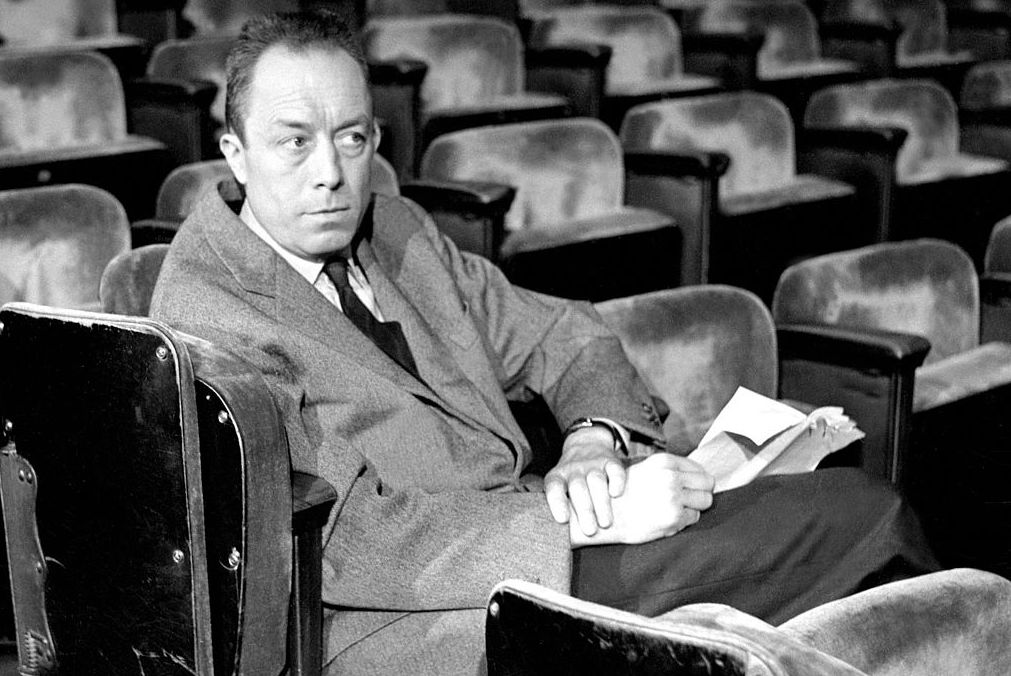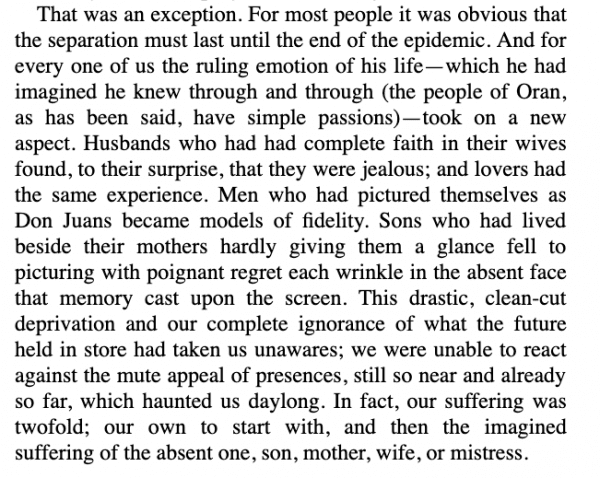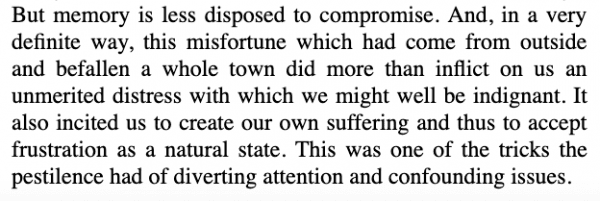‘The Plague’ Book Club.2

(This is Part Two of this blog’s online book club discussion of Albert Camus’s 1947 novel The Plague. Part One is here. Please do not participate in the comments unless you are reading, or have read, the book. I will allow relevant comments from readers who have not read the book on a case by case basis, but all commenters should keep their remarks tightly tied to the narrative itself, and not side issues. Keep in mind also that we’re reading ‘The Plague’ to help us reflect on what life might be like, and how we should behave, should the coronavirus pandemic upend life here as it has in China.)
Part Two brings with it a dramatic shift in Camus’s narrative. The first part was the big scene-setter, leading up to the closing of Oran’s gates. I have found the first chapters in Part Two to be so rich in observation and thought that I’ve read them twice.
We have met the people of Oran, and found them, in the author’s description, to be unreflective and immersed in everydayness. They never imagined something as life-changing as a siege by the bubonic plague, because they had come to think of themselves as modern people to whom catastrophes like that never happen. And yet, here it is. Now, all the townspeople are girding themselves for “the long period of exile that lay ahead.”
Now that they were cut off from the world outside, and even the possibility of normal communications with their loved ones outside the city gates, the people reconsidered the relationships they had taken for granted. Old Dr. Castel, who had a cordial, but only that, relationship with his wife, found that the two of them could not live apart. She was outside the city when the gates closed, but chose to enter the plague zone to be with him, risking a horrible death rather than live without her husband. More:

The narrator tells us that people quit thinking about when their exile might end, because in truth, nobody knew, and imagining that future, and the blessed reunion with their loved ones outside the gates, was a pain they could not easily bear. More:

“The incorrigible sorrow of all prisoners and exiles, which is to live in company with a memory that serves no purpose.” What a piercing observation! I think of Dante’s meeting in Paradiso with his ancestor Cacciaguida, who prophesies the poet’s coming exile from Florence:
You shall leave everything you love most dearly:
this is the arrow that the bow of exile
shoots first. You are to know the bitter taste
of others’ bread, how salt it is, and know
how hard a path it is for one who goes
descending and ascending others’ stairs.
In Florence, bread is not salted. Every taste of bread outside the city will remind Dante of his exile. “Descending and ascending others’ stairs” refers to the fact that the exile will sleep each night in a house not his own. Many of us have known that kind of pain. Widows and widowers ache from it. People whose marriages have ended against their will know it. Mothers and fathers who have buried a child are on intimate terms with those purposeless memories. The great lamentation of the Psalmist, writing from the Jewish people’s exile, captures it well:
By the rivers of Babylon, there we sat down, yea, we wept, when we remembered Zion. (Ps. 137)
I’m not sure, though, that those memories are useless. Dante, like the Psalmist, used them to create great poetry. Christians believe that sorrowful suffering can be a pathway to redemption. But it can also be a road to defeat and despair. I don’t know where the narrator is going with this thought — that is, why he calls the memories of what once was “without purpose.” They do have a purpose, if we can build our redemption on those memories. Right?
More:

So they have been returned to the condition in which the plague found them: lost in the everyday. Except now, they are aware of their condition. That’s the difference. The plague has revealed to them the essential nature of the way they have chosen to live in ordinary times.
The narrator tells us that people created sorrows for themselves by perseverating on things they wish they had done with, or for, their loved ones — when they were free to choose their own path.


(Sorry for the sentence fragments; I can’t copy-and-paste from the electronic version of the book I have.)
The Narrator says that in the early days of the panic, nobody thought of their neighbor. Their trauma was such that even the words that passed between them seemed to be inadequate. The only thing anybody thought about were their loved ones outside the walls, and how painful was the separation. And that “egoism of love” saved them, because it kept them from panic, says the narrator. All they could think about was the day they would be reunited, and focused on it so intensely that those who were killed by the plague barely had time to think about what was happening to them.
After that very moving, philosophical chapter, the Narrator draws back to describe the way the townspeople behaved in the first days. They began by griping about the authorities — hey, we’re doing that now, aren’t we? — and still treated the reports of deaths as an abstraction.
Folks, I’m going to have to switch gears here. My laptop just crashed, and it signed me out abruptly from the electronic version of the book that I was working on to quote here. I’m having trouble signing back in electronically on my laptop, and will have to go to the library tomorrow to get this worked out. Fortunately, I have the book on my phone still, and can read there. I’m going to quote some more from Chapter 10 now, but leave it at that for tonight — there’s so much to digest in these two chapters. I plan to post again over the weekend, though; I don’t like leaving so many days between posts.
In Chapter 10, the Narrator says that the loss of economic activity (e.g., idled cranes at the port) was obvious, but “in spite of such unusual sights our townsfolk apparently found it hard to grasp what was happening to them.” Boy, does this ever ring true. Just a few minutes ago, I read this stunning post by a biologist, who explains what it means for a virus like this to spread exponentially within a population with no immunity (as the entire world is for this novel coronavirus). My sense is that most Americans, despite all the footage we’ve seen from China (including of cities where almost no economic activity has been happening for weeks now), have not yet come to grips with what this pandemic portends for us. They’re fixated on death rates, which, even if they’re multiples of the ordinary flu, are still going to be relatively small. What they’re not seeing is the non-mortality impact of this thing, on our health system and our economy. This book-club blog entry is not the place to argue about whether or not we’re reading the signs of the times correctly; I simply note that Camus’s fictional account describes what we’re living through now: a population that finds it “hard to grasp what [is] happening to them.”
The Narrator says people were “worried and irritated,” and responded by wanting to “abuse the authorities” — yep, that’s us. That’s certainly me, scandalized as I am by the incompetence of our political leadership, who watched China burn, and did not take prudent advantage of the six weeks or so we had to prepare. The Narrator tells us that even as the bodies began to pile up in the morgue, people still negotiated with reality, wondering if all these people dying wasn’t still within the normal order of things. It was only when people began to experience tangible changes in their lives — electricity cuts, shortages in stores, idled businesses — that they started to take it seriously. Even so, says the Narrator, people still mostly focused on their own feelings.
I find the description of poor Grand’s falling in love, and then his wife leaving him, so moving. He says he lost the words to tell her how he felt about her. He says to Dr. Rieux, “A time came when I should have found the words to keep her with me — only I couldn’t.” I hear in these words the plaintive cry of a man who believes that the power of his fate lie in his words, or lack thereof. Recently I read an academic critic of postmodernism saying that the fundamental error that postmodernists make is their naive faith in the power of words to create and govern reality. I’m not saying that Camus anticipated the postmodernists (though perhaps he did, I don’t know), but I am saying that there is something modern, perhaps, in Grand’s analysis of why he lost his wife. We know from earlier chapters that Grand, the modest civil servant, is trying hard to write a book, but the words just won’t come.
Compare Grand’s diagnosis of why his wife left him with the story we hear from Rambert, the Paris journalist, who meets Dr. Rieux on the street, and tries to talk him into giving him a certificate of health so he can leave Oran and get back to Paris, and the woman he loves. Rieux tells him that’s impossible, but Rambert doesn’t want to hear it. Rieux suggests that it’s not the worst thing, being a journalist living in the middle of a big story like this. Rambert says that his mission in life is not to write newspaper articles, but to love this woman. Rieux says that may be, but there’s no way he can get out of the city.
“But I don’t belong here,” Rambert protests.
Ah, life! Isn’t it like that? We feel that we are not able to do what we are meant to be doing, and we tell ourselves that we don’t belong there, living that kind of life, when we were made for something else. Rambert also has a naive belief in the power of words: he thinks Dr. Rieux’s signature on a piece of paper declaring him plague-free will somehow open the gates of the quarantined city for him. He accuses Rieux of being heartless. He can’t face the truth, because as Camus told us earlier in the novel, Rambert, like everybody else in Oran, is a humanist, and feels in his bones that everything should work out for good.
Rambert rebukes the doctor. “You’ll soon be talking about the interests of the general public. But public welfare is merely the sum total of the private welfares of each of us.”
There is an entire stance towards life in that line. After Rambert parts in anger, Rieux wonders: did Rambert have a point? Am I being too abstract? But then he settles his mind: “Still, when abstraction sets to killing you, you’ve got to get busy with it.” There is an entire stance towards life in that line, too.
The chapter ends with a description of the exhaustion of Dr. Rieux’s days, bearing witness to the death agonies of patients under his care. Thinking of this, Rieux comes to realize that “one grows out of pity when it’s useless.” This, says the Narrator, caused the doctor’s heart to close in on itself, and it was the only thing that gave him the strength to do his duty. Rambert didn’t yet know this; the abstraction of the plague “was all that stood in the way of his happiness.” Yet the time may arrive when abstraction proves stronger than happiness. What then?
The drama of the town’s life, concludes the Narrator, became a struggle between “each man’s happiness and the abstractions of the plague.”
The people of Oran are struggling with the plague. But is this not a metaphor for the human condition? Even absent a plague, don’t all of us live between what we desire for ourselves, and think will make us happy, and the brute fact of limitation, of suffering, and ultimately, of death? I am thinking at this moment of a man I once knew, decades ago, who was in an unhappy marriage. By his account, his wife was harsh and unfeeling. Their kids were grown and out of the house. He was miserable. “Why don’t you divorce her?” I asked. I knew from our past conversations that he wasn’t a religious man, so that was no barrier.
“I made a vow,” he said, and would not look at me. He said it with such finality, and with such pain in his voice, that I didn’t challenge him. I was a lot younger then — in my twenties, at the start of my career — and simply did not understand him. This man was in maybe his early fifties — probably close to the age I am now, come to think of it. I kept track of him over the years, and though he eventually died, I know from the obituary I read that he never divorced. The man was a white Southern male of my father’s generation. I know the type well: Stoic, determined never, ever to let the corruption of the world violate the inner sanctum. The abstraction that kept him from his happiness was his wedding vows, which, I suspect, were tied tightly to his sense of honor. But now that I’ve been married for over twenty years, I understand that these vows are not an abstraction when you are prepared to sacrifice to make them real. Maybe that’s what I didn’t understand about that man those many years ago: that he had to harden himself to a situation he had no power to change (as he saw it) so he could do his duty as an honorable man. The drama of that man’s life was a struggle between his individual happiness and the abstractions of his personal code of honor, which required him to endure a joyless, loveless marriage.
I wonder at what point that man ceased to pity himself, because it was useless; it would only keep him from doing his duty. What was it like for him to think of the happy days of his marriage (for nobody enters into a marriage that’s bad from the beginning)? Were these memories of his past love, for this man, “the incorrigible sorrow of all prisoners and exiles, which is to live in company of a memory that serves no purpose”?
Time for bed. How strange that reading this novel of a fictional plague brought to my mind the sadness of a lonely man and a conversation I had decades ago. I did not imagine that I would end my night with that suffering man front to mind, and planning to say a prayer for his soul before lights-out. What an amazing book about the human condition Albert Camus has written.
Subscribe for as little as $5/mo to start commenting on Rod’s blog.